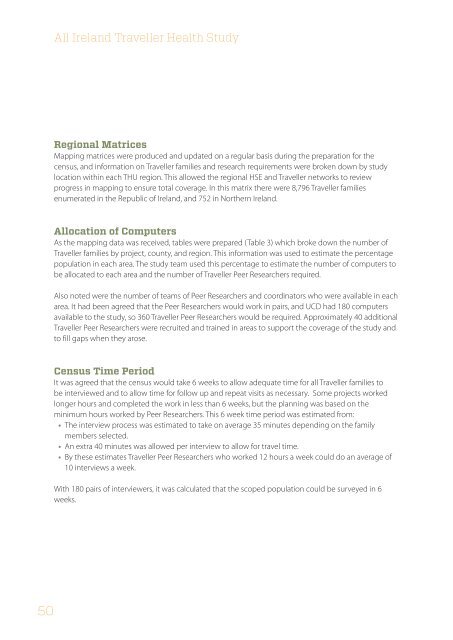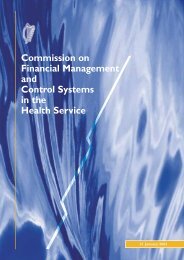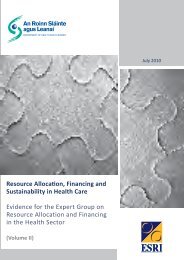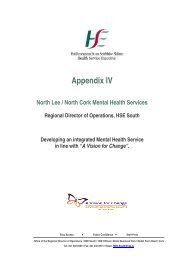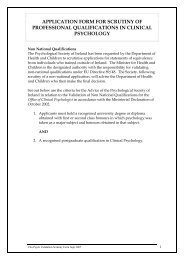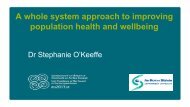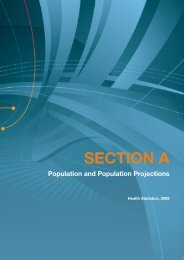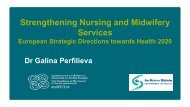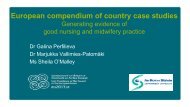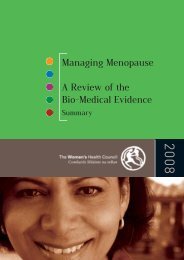- Page 1:
All Ireland Traveller Health Study
- Page 4 and 5:
All Ireland Traveller Health Study
- Page 6 and 7:
All Ireland Traveller Health Study
- Page 8 and 9:
All Ireland Traveller Health Study
- Page 10 and 11:
All Ireland Traveller Health Study
- Page 12 and 13:
All Ireland Traveller Health Study
- Page 14 and 15:
All Ireland Traveller Health Study
- Page 16 and 17:
All Ireland Traveller Health Study
- Page 18 and 19:
All Ireland Traveller Health Study
- Page 20 and 21:
All Ireland Traveller Health Study
- Page 22 and 23:
All Ireland Traveller Health Study
- Page 24 and 25:
All Ireland Traveller Health Study
- Page 26 and 27:
All Ireland Traveller Health Study
- Page 28 and 29:
All Ireland Traveller Health Study
- Page 30 and 31:
All Ireland Traveller Health Study
- Page 32 and 33:
All Ireland Traveller Health Study
- Page 34 and 35:
All Ireland Traveller Health Study
- Page 36 and 37:
All Ireland Traveller Health Study
- Page 38 and 39:
All Ireland Traveller Health Study
- Page 40 and 41:
All Ireland Traveller Health Study
- Page 42 and 43:
All Ireland Traveller Health Study
- Page 44 and 45: xlii All Ireland Traveller Health S
- Page 46 and 47: All Ireland Traveller Health Study
- Page 48 and 49: All Ireland Traveller Health Study
- Page 50 and 51: All Ireland Traveller Health Study
- Page 52 and 53: All Ireland Traveller Health Study
- Page 54 and 55: All Ireland Traveller Health Study
- Page 56 and 57: All Ireland Traveller Health Study
- Page 58 and 59: All Ireland Traveller Health Study
- Page 60 and 61: All Ireland Traveller Health Study
- Page 62 and 63: All Ireland Traveller Health Study
- Page 64 and 65: All Ireland Traveller Health Study
- Page 66 and 67: All Ireland Traveller Health Study
- Page 68 and 69: All Ireland Traveller Health Study
- Page 70 and 71: All Ireland Traveller Health Study
- Page 72 and 73: All Ireland Traveller Health Study
- Page 74 and 75: All Ireland Traveller Health Study
- Page 76 and 77: All Ireland Traveller Health Study
- Page 78 and 79: All Ireland Traveller Health Study
- Page 80 and 81: All Ireland Traveller Health Study
- Page 82 and 83: All Ireland Traveller Health Study
- Page 84 and 85: 40 All Ireland Traveller Health Stu
- Page 86 and 87: All Ireland Traveller Health Study
- Page 88 and 89: All Ireland Traveller Health Study
- Page 90 and 91: All Ireland Traveller Health Study
- Page 92 and 93: All Ireland Traveller Health Study
- Page 96 and 97: All Ireland Traveller Health Study
- Page 98 and 99: All Ireland Traveller Health Study
- Page 100 and 101: All Ireland Traveller Health Study
- Page 102 and 103: All Ireland Traveller Health Study
- Page 104 and 105: All Ireland Traveller Health Study
- Page 106 and 107: All Ireland Traveller Health Study
- Page 108 and 109: All Ireland Traveller Health Study
- Page 110 and 111: All Ireland Traveller Health Study
- Page 112 and 113: All Ireland Traveller Health Study
- Page 114 and 115: All Ireland Traveller Health Study
- Page 116 and 117: All Ireland Traveller Health Study
- Page 118 and 119: All Ireland Traveller Health Study
- Page 120 and 121: All Ireland Traveller Health Study
- Page 122 and 123: All Ireland Traveller Health Study
- Page 124 and 125: All Ireland Traveller Health Study
- Page 126 and 127: All Ireland Traveller Health Study
- Page 128 and 129: All Ireland Traveller Health Study
- Page 130 and 131: All Ireland Traveller Health Study
- Page 132 and 133: All Ireland Traveller Health Study
- Page 134 and 135: All Ireland Traveller Health Study
- Page 136 and 137: All Ireland Traveller Health Study
- Page 138 and 139: All Ireland Traveller Health Study
- Page 140 and 141: All Ireland Traveller Health Study
- Page 142 and 143: All Ireland Traveller Health Study
- Page 144 and 145:
All Ireland Traveller Health Study
- Page 146 and 147:
All Ireland Traveller Health Study
- Page 148 and 149:
All Ireland Traveller Health Study
- Page 150 and 151:
All Ireland Traveller Health Study
- Page 152 and 153:
All Ireland Traveller Health Study
- Page 154 and 155:
All Ireland Traveller Health Study
- Page 156 and 157:
All Ireland Traveller Health Study
- Page 158 and 159:
All Ireland Traveller Health Study
- Page 160 and 161:
All Ireland Traveller Health Study
- Page 162 and 163:
All Ireland Traveller Health Study
- Page 164 and 165:
All Ireland Traveller Health Study
- Page 166 and 167:
All Ireland Traveller Health Study
- Page 168 and 169:
All Ireland Traveller Health Study
- Page 170 and 171:
All Ireland Traveller Health Study
- Page 172 and 173:
All Ireland Traveller Health Study
- Page 174 and 175:
All Ireland Traveller Health Study
- Page 176 and 177:
All Ireland Traveller Health Study
- Page 178 and 179:
All Ireland Traveller Health Study
- Page 180 and 181:
All Ireland Traveller Health Study
- Page 182 and 183:
All Ireland Traveller Health Study
- Page 184 and 185:
All Ireland Traveller Health Study
- Page 186 and 187:
All Ireland Traveller Health Study
- Page 188 and 189:
All Ireland Traveller Health Study
- Page 190 and 191:
All Ireland Traveller Health Study
- Page 192 and 193:
All Ireland Traveller Health Study
- Page 194 and 195:
All Ireland Traveller Health Study
- Page 196 and 197:
All Ireland Traveller Health Study
- Page 198 and 199:
All Ireland Traveller Health Study
- Page 200 and 201:
All Ireland Traveller Health Study
- Page 202 and 203:
All Ireland Traveller Health Study
- Page 204 and 205:
All Ireland Traveller Health Study
- Page 206 and 207:
All Ireland Traveller Health Study
- Page 208 and 209:
All Ireland Traveller Health Study
- Page 210 and 211:
All Ireland Traveller Health Study
- Page 212 and 213:
All Ireland Traveller Health Study
- Page 214 and 215:
All Ireland Traveller Health Study
- Page 216 and 217:
All Ireland Traveller Health Study
- Page 218 and 219:
All Ireland Traveller Health Study
- Page 220 and 221:
All Ireland Traveller Health Study
- Page 222 and 223:
All Ireland Traveller Health Study
- Page 224 and 225:
All Ireland Traveller Health Study
- Page 226 and 227:
All Ireland Traveller Health Study
- Page 228 and 229:
All Ireland Traveller Health Study
- Page 230 and 231:
All Ireland Traveller Health Study
- Page 232 and 233:
All Ireland Traveller Health Study
- Page 234 and 235:
All Ireland Traveller Health Study
- Page 236 and 237:
All Ireland Traveller Health Study
- Page 238 and 239:
All Ireland Traveller Health Study
- Page 240 and 241:
All Ireland Traveller Health Study
- Page 242 and 243:
All Ireland Traveller Health Study
- Page 244 and 245:
All Ireland Traveller Health Study
- Page 246 and 247:
All Ireland Traveller Health Study
- Page 248 and 249:
All Ireland Traveller Health Study
- Page 250 and 251:
All Ireland Traveller Health Study
- Page 252 and 253:
All Ireland Traveller Health Study
- Page 254 and 255:
All Ireland Traveller Health Study
- Page 256 and 257:
All Ireland Traveller Health Study
- Page 258 and 259:
All Ireland Traveller Health Study
- Page 260 and 261:
All Ireland Traveller Health Study
- Page 262 and 263:
All Ireland Traveller Health Study
- Page 264 and 265:
All Ireland Traveller Health Study
- Page 266 and 267:
All Ireland Traveller Health Study
- Page 268 and 269:
All Ireland Traveller Health Study
- Page 270 and 271:
All Ireland Traveller Health Study
- Page 272 and 273:
All Ireland Traveller Health Study
- Page 274 and 275:
All Ireland Traveller Health Study
- Page 276 and 277:
All Ireland Traveller Health Study
- Page 278 and 279:
All Ireland Traveller Health Study
- Page 280 and 281:
All Ireland Traveller Health Study
- Page 282 and 283:
All Ireland Traveller Health Study
- Page 284 and 285:
All Ireland Traveller Health Study
- Page 286 and 287:
All Ireland Traveller Health Study
- Page 288 and 289:
All Ireland Traveller Health Study
- Page 290 and 291:
All Ireland Traveller Health Study
- Page 292 and 293:
All Ireland Traveller Health Study
- Page 294 and 295:
All Ireland Traveller Health Study
- Page 296 and 297:
All Ireland Traveller Health Study
- Page 298 and 299:
All Ireland Traveller Health Study
- Page 300 and 301:
All Ireland Traveller Health Study
- Page 302:
258 All Ireland Traveller Health St


